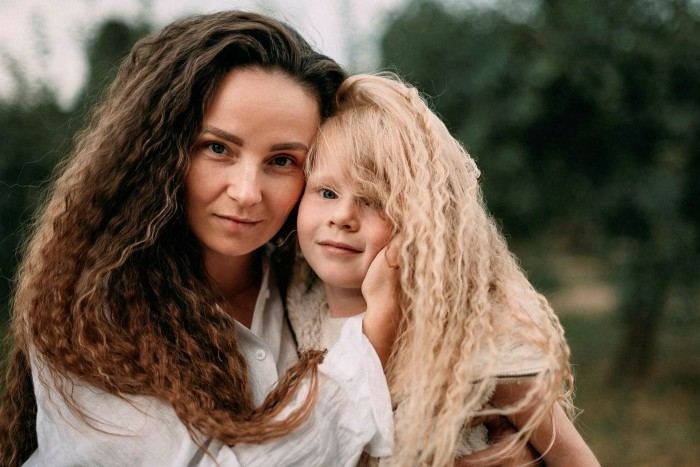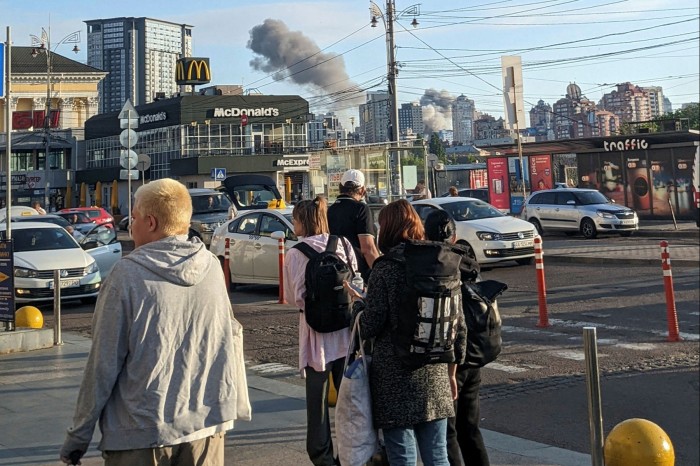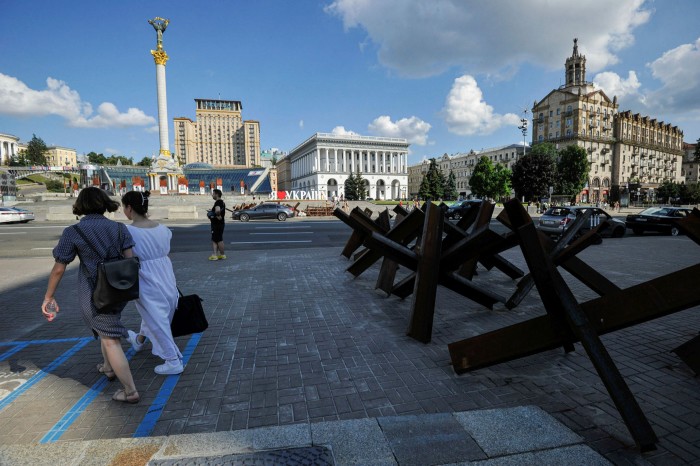Viktoriia Vasylieva, a wedding photographer, and her eight-year-old daughter returned to their home in Kyiv in recent weeks — enjoying the relative peace in a city that felt distant from the brutal artillery war raging in Ukraine’s eastern Donbas region.
But the calm was shattered again this week in a deadly rocket attack. In a series of missile strikes across Ukraine from Kremenchuk to Odesa, Moscow sent a message: it is still willing to kill civilians, wherever they live. Mykolaiv in southern Ukraine became the latest city to face bombardment, in a barrage on Friday and early Saturday morning.
“I understand that remaining here can be dangerous,” said Vasylieva, who moved to Kyiv from Crimea years ago. “But I feel that this is my home.”
She and her daughter have grown familiar with the “rule of two walls” for when air-raid sirens sound, scurrying for shelter in a corridor or bathroom. But having fled Kyiv three days after Russia invaded in February, they are not about to up sticks again. “There is nothing worse than being a refugee,” said Vasylieva.
Months after Russian troops shelled parts of the capital and brutally occupied Irpin and Bucha, two leafy north-western suburbs, Kyivans are trying to restore something resembling normality.

Cafés and bars in the city centre — which before the war were a magnet for a growing middle class and foreigners seeking a Berliner hipster vibe at Ukrainian prices — are beginning to hum again. By 6pm, cocktail drinkers on Reitarska Street are spilling on to the pavement. The 11pm curfew means some parties start a little earlier.
But escaping signs of war is impossible.
A display of destroyed Russian military hardware brings gawkers to the central Mykhailivska Square. Murals honour war dead. A huge banner on mayor Wladimir Klitschko’s administrative building calls — in English — for the fighters captured by Russia after it destroyed Mariupol to be freed.
Cars must still weave in and out of antitank barricades of spiked steel known as “izhaki”, or hedgehogs, which are scattered along the capital’s streets. Sandbags cover statues and buttress official buildings.
Some of the city’s leading creative lights wonder if a candle has been snuffed out by Putin’s invasion.
“Everything was flourishing, the whole country was booming. Kyiv was the new Berlin. The art scene was huge,” said Darko Skulsky, who moved to the city from Philadelphia and became executive producer of Radioaktive Film, one of the companies behind the Chernobyl HBO series. “It had the coolest bars and nightclubs in the world, great restaurants. Then this happened.”
Skulsky now lives in Warsaw. “There’s definitely tears. All the time,” he said.

Almost 4mn people lived in Kyiv before the invasion on February 24. The population plunged as Russian troops neared. It has recovered to around 2.7mn now, but the trauma lingers.
“The city is different. It’s empty,” said Vladyslav Piontkovskyy, a 29-year-old analyst who left Kyiv with his wife and infant daughter in March. They returned a few weeks ago.
“Subtle things have changed. Your favourite restaurant is no longer selling your favourite dish . . . We did a rabies jab for our pets, and the vet told us they were running out of everything.”
Like many others, his anxieties stretch far beyond Kyiv. As the Russians invaded, his grandparents chose to remain near Kharkiv, in a town now occupied by Russia. The family lost contact with them in March.
Many in the city have similar stories of a country ripped apart by war. But the mood is also defiant.
Just hours after the missile strike on Sunday, music was pumping just down the road at HVLV, a “pre-party” hang-out, where hipsters smoked rolled cigarettes, browsed vinyl records and shared cocktails with sunburned soldiers.
The men had been involved in the retreat from Severodonetsk a few days earlier, but were preparing to return to Lysychansk, another town where Russians are pressing their Donbas offensive.
“We are going back to take the Donbas,” said Serhii Filimonov, a soldier with a “Victory or Valhalla” tattoo across his chest.

In the central Brodsky Synagogue, Rita Korol and her husband Viktor Prister talked of living through the second world war and Nazi invasion, when both lost relatives. Many members of their synagogue left Kyiv this time, too, fearing Putin’s army. Few had returned. Korol and Prister remained.
“It’s hard at our age to leave,” she said. Did they feel safe? “No.” The couple have no bunker to hide in. “When I hear the sirens, I am scared.”
While many foreign brands have closed stores or suspended operations, local businesses are showing more steel. The kosher deli next to the synagogue is still managing to sell goods imported from the US and Israel. Inside the Gulliver shopping mall up the road, which remained open during the invasion, the high-end Silpo supermarket is stocked with ripe fruit, choice meats and fine wines.
Piontkovskyy, the analyst, is one of many native Russian speakers in Kyiv trying to switch to speaking Ukrainian, eschewing the invaders’ language, literature and music. It is another identity adjustment for people who never believed Russia posed a threat.
Vasylieva, the photographer, says she now picks up business taking pictures of Kyivans who return briefly for one final visit to their city.
She has fallen out with her Russian-supporting father in annexed Crimea, who denies the news of Russian atrocities and missile strikes. But her daughter’s mental state, not her father’s, is her priority.
“I don’t want her to see something awful,” she says. “Her psychological condition depends on me.”
https://news.google.com/__i/rss/rd/articles/CBMiP2h0dHBzOi8vd3d3LmZ0LmNvbS9jb250ZW50LzQ3OWExYzFjLTExOTgtNDdhMy04NjM3LThlM2MyNTFlNGJjONIBAA?oc=5
2022-07-02 13:44:38Z
1477578397
Tidak ada komentar:
Posting Komentar